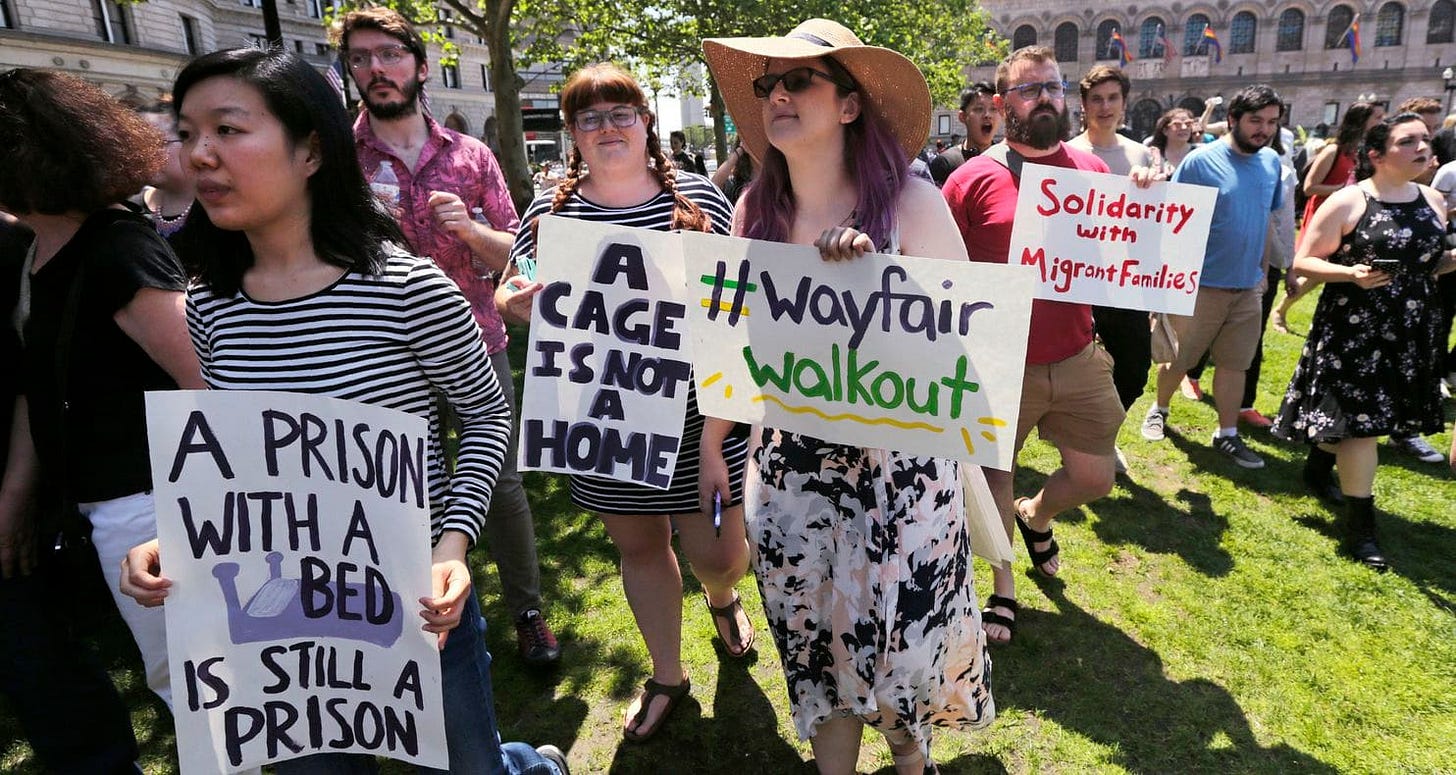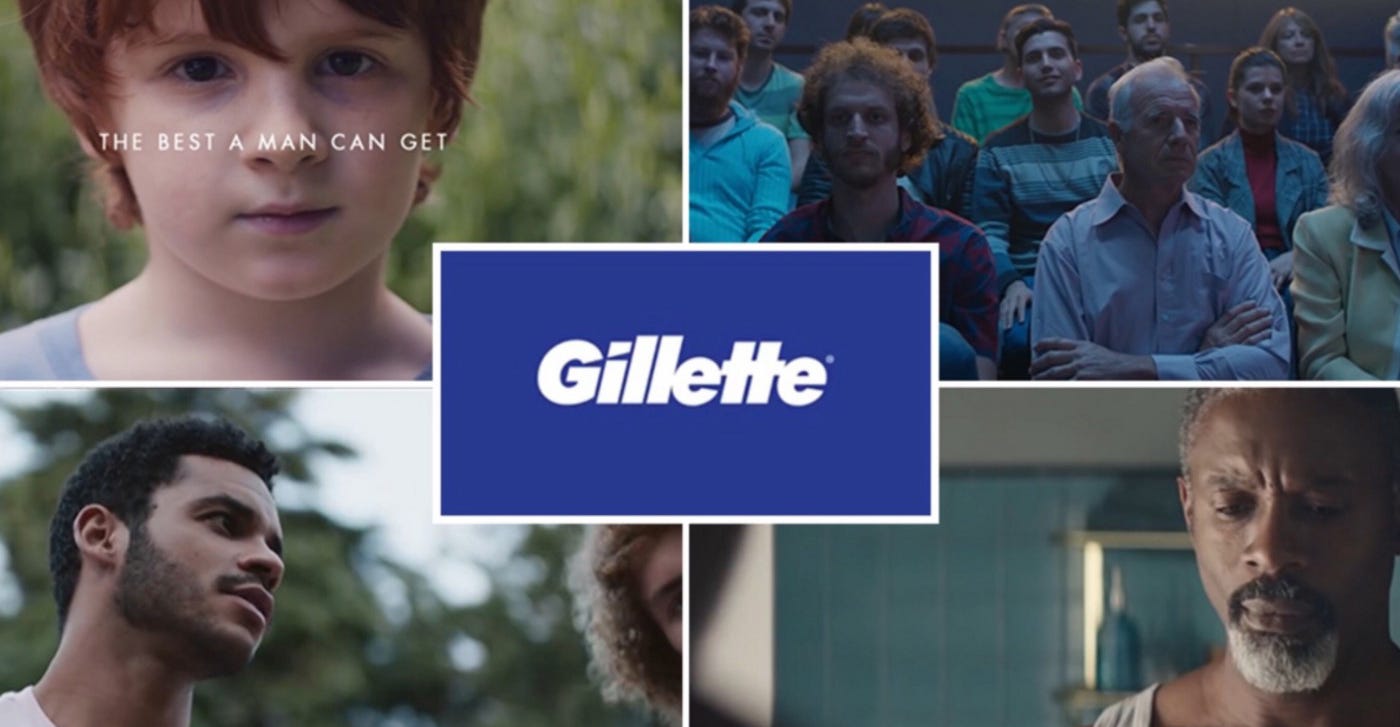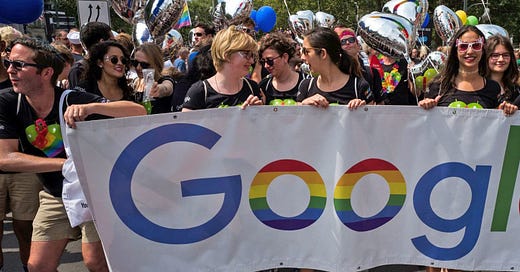Marketing to Employees
Welcome to Marketing BS, where I share a weekly article dismantling a little piece of the Marketing-Industrial Complex — and sometimes I offer simple ideas that actually work.
If you enjoy this article, I invite you to subscribe to Marketing BS — the weekly newsletters feature bonus content, including follow-ups from the previous week, commentary on topical marketing news, and information about unlisted career opportunities.
Thanks for reading and keep it simple,
Edward Nevraumont

Marketing to Employees
We live in an era of political volatility. If a company dares to take a position on a controversial topic, they should expect some degree of public backlash. That said, social media takedowns aren’t just limited to risk-takers — onslaughts of criticisms and boycotts can (and regularly do) target companies that DON’T take a stand on controversial issues, or that offer a neutral viewpoint, or announce an ambiguous position, or wait too long to take a position…
But what’s the REAL fallout of comments like “you’ve just lost a long-time customer”? And what’s ACTUALLY compelling corporations to reconsider their stance? The truth, I think, isn’t that obvious.
Let’s examine a topical example from last week. The Board of Directors for San Francisco Pride received a petition advocating for the removal of Google as a sponsor for any Pride-related activities, including participation in the famed Pride Parade. You can read the demand letter online (OF COURSE it was posted publicly; drawing widespread attention is a core strategy for inciting change in 2019).
The petition plainly states its arguments for urgent action:
Whenever we press for change, we are told only that the company will “take a hard look at these policies.”
We are told to wait. For a large company, perhaps waiting is prudent, but for those whose very right to exist is threatened, we say there is no time to waste, and we have waited too long, already. We are no longer content to wait.
At first blush, the petition appears very similar to the many other protest statements issued to large corporations by left-leaning San Francisco activists. This time, though, there’s a new twist — the petition’s authors were all employees at Google. And they weren’t talking the situation lightly:
We have considered the possibility that our employer will punish us for signing this letter, or that supporters of these very hatemongers will attack us personally, online or otherwise, simply for speaking out against them. Despite these risks, we are compelled to speak.
If another official platform, YouTube, allows abuse and hate and discrimination against LGBTQ+ persons, then Pride must not provide the company a platform that paints it in a rainbow veneer of support for those very persons…[W]e ask you to join us in resisting LGBTQ+ oppression on the internet, and the subjugation of our right to equality in favor of calculated business concerns. [Emphasis mine]
By the time of the June 30 parade, the petition included 145 signatories — all Google employees.
In an above comment, I described the employee-driven action as a “new twist,” but that’s not entirely accurate. Google has faced similar pressures in the past.
In June 2018, Google decided against renewing a contract with the Department of Defense (the project involved using artificial intelligence to analyze drone footage). From The Washington Post at the time:
Thousands of Google employees wrote chief executive Sundar Pichai an open letter urging the company to cancel the contract…saying the company’s assistance in developing combat-zone technology directly countered the company’s famous “Don’t be evil” motto. [Emphasis mine]
Notably, Google revealed news about the contract’s expiration during a meeting with employees — instead of a public announcement.
Of course, Google is not the only corporation to discover that the sharpest pitchforks are sometimes the ones wielded by employees.
Consider the recent PR debacle that dragged down Wayfair, the thriving online retailer of affordable home furnishings. The company agreed to sell $200,000 worth of furniture for distribution to facilities detaining children near the US-Mexico border.
A letter — signed by 550 Wayfair employees — demanded immediate action from the company’s executives.
And the letter’s authors weren’t pulling any punches with the language used to condemn their employer:
We believe that the current actions of the United States and their contractors at the Southern border do not represent an ethical business partnership Wayfair should choose to be a part of.
At Wayfair, we believe that “everyone should live in a home that they love.” Let’s stay true to that message by taking a stand against the reprehensible practice of separating families, which denies them any home at all. [Emphasis from original]
Needless to say, signatories to the Wayfair letter were dissatisfied by the statement issued by CEO Niraj Shah:
No matter how strongly any one of us feels about an issue, it is important to keep in mind that not all employees or customers agree. Your fellow employees hold a wide range of opinions and perspectives and Wayfair, as a mass-market brand, is oriented to serve a broad and diverse customer base.
Wayfair ultimately refused to cancel the contract. In response, hundreds of employees walked out of the company’s Boston headquarters, where they were joined by thousands of supporters. No surprise that Wayfair found themselves in the spotlight. Living conditions for children detained at the border might be the most contentious issue in America today.
Politics aside, was this contract a good business decision for Wayfair? In reality, putting “politics aside” is easier said than done, and a person’s perspective on this question likely depends upon their voting preferences.
What about public policy — does a large furniture order alleviate or exacerbate tensions related to detention centers?
Consider the opinion voiced by Evelyn Stauffer, director of communications at HHS’s Administration for Children and Families:
Those who are protesting Wayfair’s sale of beds for unaccompanied alien children need to ask themselves what the alternative should be to keep the children comfortable.
What, then, can we learn from the Wayfair affair?
We know that taking a political stand places a company between a rock and a hard place, sparking the tinderbox for social media fury. In most cases, though, the Twitterverse criticizes a new product or ad campaign — something that a company intentionally delivers to the public. Wayfair’s PR nightmare, on the other hand, was completely instigated by employees, not consumers (who wouldn’t have even known about the connection to detention centers until alerted by some concerned staff members).
As a key takeaway from this situation, I would like to highlight one concept: business leaders need to recognize the growing phenomenon of employees who care A LOT about the business practices of their employer.
In fact, a sense of “doing what’s right” might be more important to employees than customers. A comparison of Google search results shouldn’t be taken as authoritative, but for what it’s worth: “wayfair walkout” generates 40 times more results than “wayfair boycott” (6.9 million versus 170,000).

How much do customers care about a company’s values?
We’re all familiar with a situation like this: an article circulates on social media, accusing a company of mishandling some situation (discrimination of a customer, insensitive post on social media, etc.). In a knee-jerk reaction, someone you know declares a personal boycott of the company.
Beyond the anecdotes, how impactful are people’s decisions to shun a company? Academic research suggests that customer boycotts are NOT usually effective. (You can read some convincing reports here, here, and here).
Let’s investigate a notable example from 2012. Dan Cathy, President of Chick-fil-A (an Atlanta-based fast-food chain) declared his opposition to same-sex marriage, stating that the company supports “the biblical definition of the family unit.”
Overnight, the restaurant became a lightning rod. As described in Slate’s recent revisiting of the scandal:
Many progressives quickly said they would boycott the chain. GLAAD staged a “kiss-in” at Chick-fil-A restaurants across the country…The mayors of Chicago, San Francisco, and Boston suggested the restaurant would not be welcome in their cities. “Closest #ChickFilA to San Francisco is 40 miles away & I strongly recommend that they not try to come any closer,” the mayor of San Francisco tweeted.
Did the boycott impact the bottom line? Chick-fil-A is not a public company, so precise figures are not available; that said, outside-in estimates suggest that sales remained strong since the “boycott” and grew +13% year-over-year in 2018. Today, their stores earn more money per restaurant than McDonalds, Starbucks, and Subway COMBINED.
Here’s how Slate assessed the aftermath:
Anecdotally, many progressives still feel vaguely guilty about eating at Chick-fil-A — but they eat there anyway, citing factors like convenience, picky kids, and the universally acknowledged excellence of its food compared with fast-food competitors. [Emphasis mine]
Our brains are VERY comfortable juggling contradictory opinions: “I do not want to support a company that violates my political views” AND “I enjoy the taste and convenience of their chicken.”
Moral of the story: customers don’t care about your brand. They care about whether your product meets their immediate needs. They care about quality and price and convenience. But most customers don’t actually care what a fast-food restaurant or search engine or furniture retailer has to say about same-sex marriage or child labour or climate change. And (very, very) few customers care enough to permanently change their behavior.
As Joe Parrish wrote in The Drum:
A brand’s biggest competition is flat indifference. We have too much to care about to care about brands. My agency did some research to find if consumer indifference was real and found that 90 percent of consumers say that, aside from a few, they don’t care about the vast majority of brands. And 73 percent of consumers said that the majority of brands they buy every day are interchangeable. [Emphasis mine]
Customers just don’t care about you.
But you know who does care? Employees.
Employees are increasingly pushing their employers into activism not because they HATE their companies, but because they CARE about them. At professional networking events, the first two questions are usually: 1) “What’s your name?” and 2) “Where do you work?” Clearly, many people base their self-identity on their employment. And if an employer isn’t standing up for the ideals you value, it’s natural to support change.
During my time at General Assembly, we emphasized our socially progressive values. We released statements on topics like support for underrepresented groups, on the difference between diversity, inclusion and equity, and on the lack of diversity in data science. When the US Department of Justice declared that a law protecting workers from sex discrimination would not apply to the LGBTQ+ community, General Assembly took a firm position opposing the Department.
How successful were these actions in attracting young people who wanted to learn to code? To be honest, I saw absolutely no evidence that prospective students knew anything about our stances, let alone used those stances to inform their decision to spend $15,000 and three months of their life in order to retrain as front-end developers.
What I did see were EMPLOYEES who were passionate about the values espoused by General Assembly. During the 2016 election, many of GA’s employees were 1) young, 2) educated, and 3) based in Manhattan — groups that Clinton won by +30%, +21%, and +80%. The day after Trump’s victory, there were some public tears in the office. In response, CEO Jake Schwartz wrote a thoughtful letter recognizing the emotional shock being felt by some members of his team. When political news causes both employees and executives to react in visceral ways, you can understand the impetus for GA’s action on major social issues as they arose.
Making sure your employees feel that their values are respected is important. This concept applies for companies small enough to fit in a single room, as well as giant corporations with worldwide reach. When an organization is small, keeping employees engaged is a matter of managing personal relationships. As the company develops, a CEO’s role shifts from management to leadership. Eventually a company grows so large that the only way a CEO can influence an organization is through, for lack of a better phrase, “internal marketing” — the type of employee-sensitive action demonstrated by GA’s CEO in the above example.
The Mickey Mouse Discount

Back in 2013, I wrote an article for Wharton’s Entrepreneurship magazine:
I started my career at Procter & Gamble. Sometimes people would leave P&G to work for Disney and took about a 20 percent pay cut to do the same job. We called it the Mickey Mouse discount. A close friend left telecom to work in the music industry and took a 50 percent pay cut to do it. That’s still better than people starting in film who are expected to work for free for a few years to prove themselves. No one works for free in oil exploration or aluminum siding installation or cardboard manufacturing. Some companies and industries are considered ‘cool’. As soon as that happens they find it a lot easier to find people to work for them — and correspondingly can choose to pay that talent less than market rates.
Today, tech companies are facing acute shortages of qualified talent. Start-ups can rarely pay the salaries of Google or Facebook or Amazon. What CAN help start-ups attract talent? A “mission-driven” culture that allows employees to not only earn a living, but also work toward supporting their beliefs. Notice how few businesses seem to just “sell stuff” anymore; instead, they’ve realized the importance of turning their e-commerce businesses into “missions.” Casper doesn’t sell mattresses — they improve our sleep so we can live “fuller, more adventurous lives.” Airbnb doesn’t rent houses — they provide “a home where you belong.” You might think Delta Airlines strives to provide high quality transportation at competitive prices, but you’d be wrong. Delta is dedicated to bettering standards of living and the environment where we and [their] customers live and work.
Every company is on a mission. Not because customers care, but because without a mission, the only way to get an employee to work for you is by paying them more money than their next best alternative. If you want to boost your salary performing almost exactly the same day-to-day tasks you do now, go join Philip Morris and help them sell cigarettes. No one works for Philip Morris because of a fervent personal conviction for increasing the number of tobacco users. People pursue employment with Philip Morris because they desire the (additional) amount of money that the company provides. In contrast to the “Mickey Mouse discount,” there’s essentially a “lung cancer bonus.”
The clearer a company can brand their activities as a “mission to do good,” the less they need to pay for labor. This practice is helpful when you are building a small company, but it becomes indispensable when you are big. If you are hiring five or ten people per year, you can (and should) recruit the best talent you can find. For companies like Amazon that hire 100,000+ people per year, it’s very difficult to find people that are all “significantly above average” — when your numbers are that big, you eventually you run out of exceptional people! So, you need to 1) pay well AND 2) create the type of environment that your ideal employees would value.
America is living through an era of political polarization. As a few quick examples: Americans are split 48-48 pro-choice/pro-life, 31-30 for decreasing/increasing immigration, and 41-37 for confirming/rejecting Brett Kavanaugh for the Supreme Court. In such a climate, companies might seem foolhardy for taking a stand on any political issue. No matter which side a company chooses, they seem destined to offend half their customers. And yet, companies regularly stake out positions, and — except for outliers like Hobby Lobby or Chik-fil-A — those positions typically end up on the (social) left of the political spectrum. Why? Because — once again — customers don’t actually care about companies’ values. If Disney highlights a storyline that explores gender inclusivity, Ann Coulter fans will still flock to theatres for The Avengers. The opposite scenario (suppose Disney characters condemn same-sex marriage) WOULD pose a problem for Disney because it risks their relationship with employees — the type of young, educated, and urban workers the company needs to attract and retain.
Risky Marketing

In last week’s newsletter, I wrote about brands using controversy to drive sales:
In time, all of those campaigns succeeded in attracting free media coverage,the same way Donald Trump “managed” the media during his Presidential bid. By regularly uttering controversial statements, Trump provided a supply of content for the media to debate (and that strategy took him all the way to the nomination and the presidency). The Nike and Burger King ads (and others like the Gillette “toxic masculinity” ad) try to copy the same tactic — wield controversy as a tool to obtain free media coverage, attention, awareness, and consideration.
Many pundits expressed the opinion that Gillette’s toxic masculinity campaign would hurt the brand. Some communicated the idea that the political tone would offend lifelong customers, driving them to a rival company. Moreover, the ad seemed targeted more at women than at men — Gillette’s core customer base. Was the company hoping that women would — because of the ad’s depiction of social issues — pressure their male partners shave with Gillette?
Some journalists suggested Gillette had kicked the ball into their own net. From Forbes:
...this advert feels like a lecture, an accusation aimed at the viewer is spreading the net too wide, tarring too many people with the same brush. We're not talking about a small unrepresentative minority of misogynist and aggressive alpha males who hate the core premise of the ad, but rather a vast number of normal, decent, everyday men who feel alienated by this, and feel no resonance with the way the message is being communicated.
But since you’ve read this far, you know that none of these ideas matter. Gillette’s male customers don’t care about the political stance of P&G one way or the other. Men will continue purchasing their usual razor. If they DO switch, it won’t have anything to do with “toxic masculinity” — maybe their preferred razor is out of stock or maybe there’s a sale on another brand or maybe their wife picks up the wrong refill at the store or maybe they were enticed by a display featuring new razor with 18 blades. Purchase decisions are influenced by a plethora of minor factors, and a company’s political viewpoints just don’t matter very much.
But you know what DOES matter? Awareness and consideration.
How does a company earn awareness and consideration? By being remembered.
In order to get remembered, you need people to talk about your company. And nothing sparks conversations like a little controversy. P&G’s toxic masculinity ads didn’t work DESPITE the critical backlash; the ads were successful BECAUSE they triggered heated discussion among journalists, pushing the controversy into the mass market. In theory, P&G could have achieved the same results by courting controversy in the other direction — if they had produced, say, overtly misogynistic ads. Flipping the political perspectives still wouldn’t have mattered for most of their consumers.
But it would have mattered — significantly — for their employees.
Once you realize how much of a company’s marketing resources are intended for employees rather than customers, many business decisions begin to make a lot more sense. Corporate Social Responsibility initiatives, for instance, do not exist to reduce CUSTOMER churn and grow brand market share. CSR exists to reduce EMPLOYEE churn and attract talent.
Last week’s newsletter mentioned the Nike ad narrated by quarterback Colin Kaepernick (who gained notoriety for kneeling during the playing of the national anthem before football games). Nike’s ongoing support of Kaepernick has infuriated many customers and bewildered many analysts.
Nike knows what they are doing (illustrating the ideas from this article!).
For many American customers (especially middle-aged sports fans), Kaepernick remains a controversial figure. But he’s not perceived as provocative by the top graduates from colleges where Nike is recruiting their next generation of marketers, designers, and business leaders. In other words, their future employees — the ones who revere Kaepernick’s message from the Nike ad, “Believe in something…even if it means sacrificing everything.”
Keep it simple,
Edward
If you enjoyed this post, I encourage you to click the little heart icon below my bio. Thanks!
Edward Nevraumont is a Senior Advisor with Warburg Pincus. The former CMO of General Assembly and A Place for Mom, Edward previously worked at Expedia and McKinsey & Company. For more information, including details about his latest book, check out Marketing BS.


